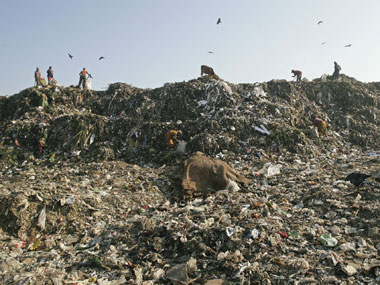Even after the Supreme Court’s direction to the state and Central governments to ban manual scavenging, it seems now that the Narendra Modi government is promoting the hazardous practice. National Career Services that was launched recently by the government as part of its Skill India initiative, has a section in its Career Section, which hires manual scavengers with a single click. According to this report in The Hindu, under the ‘unorganised sector’ panel of the website, “a ‘Sweeper, Sewer’ is ’expected to’ clean sewage systems by ‘using various cleaning instruments’, including bamboo or iron rod, and collecting debris and refuse in a bucket using a spade and handing this bucket to helper outside manhole.” [caption id=“attachment_2378696” align=“alignleft” width=“380” class=" “]  Agencies[/caption] Interestingly, the government has classified the job profile of a ‘Safai Karamchari’ and a ‘scavenger’ as being “mildly hazardous or dangerous”, while putting them in the same category as “astrologer” and “palmist”, which also come under the unorganised sector careers. When the portal was launched on 20 July, Modi had said that its purpose was to link two crore job seekers with nearly nine lakh establishments. He had said, “…it is essential for Indian society to develop a consciousness towards ‘dignity of labour’.” The practice of manual scavenging, which has officially been banned for decades in India, continues unabated in several states. According to the latest Socio-Economic Caste Census data released on July 3, 1,80,657 households are engaged in this degrading work for a livelihood. With 63,713, Maharashtra tops the list with the largest number of manual scavenger households, followed by Madhya Pradesh, Uttar Pradesh, Tripura and Karnataka, as per Census data. Union Minister for Social Justice and Empowerment Thaawar Chand Gehlot told The Hindu that under the new 2013 law to ensure the rehabilitation of manual scavengers, 2,500 manual scavenger families, who clean human excreta with their bare hands, had been identified so far. Interestingly, Maharashtra, a BJP-ruled state, announced on Tuesday that the government will end the practice of manual scavenging by March 2016. Chief Minister Devendra Fadnavis has directed officials to ascertain the exact number of manual scavengers and prepare alternative employment plans to end the practice by March. Speaking to The Indian Express, Fadnavis said, “Maharashtra was the first to raise concern over manual scavengers. Various cleanliness schemes were undertaken but manual scavenging continues in some parts of the state.” Manual scavenging attracts imprisonment for up to one year and a fine of Rs 2,000 on individuals or organisations who hire such labour, under the Employment of Manual Scavengers and Construction of Dry Latrines (Prohibition) Act, 1993. However, not even a single employer has been booked for engaging a septic tank worker even as new public toilets being built under the Swachh Bharat Abhiyaan have spawned more septic tanks and sewers; paradoxically increasing the need for more manual scavengers and septic tank cleaners, as this report in India Today noted.
Despite Supreme Court directions to end the practice of manual scavenging, the dangerous occupation is a career option in Modi’s India
Advertisement
End of Article


)

)
)
)
)
)
)
)
)



